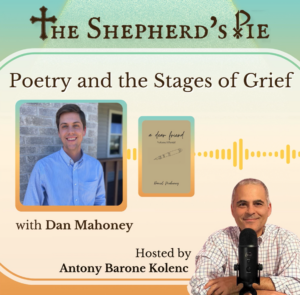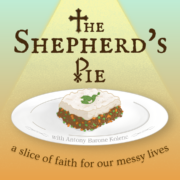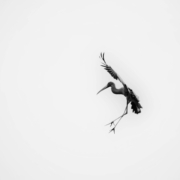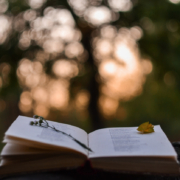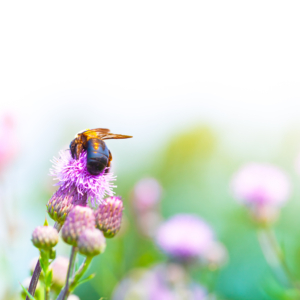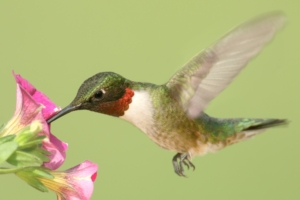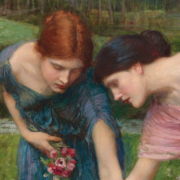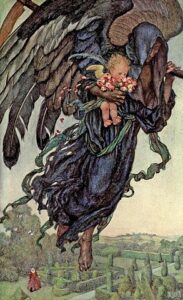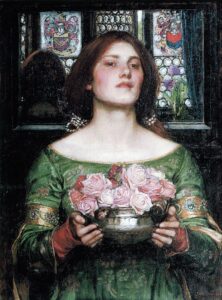A Poem, an Ornament, and a Choice
Even though it is now a few weeks since the official end of the Christmas season (with the exception of those who close out Christmas with the celebration of Candlemas), I still have one ornament up. This particular ornament, called “Snowy Woods,” is always the last one to be packed away, and every year it makes the short journey from the Christmas tree downstairs to the family prayer space, upstairs. It hangs in silence until the end of the month, inviting reflection, contemplation, and most importantly, it asks a single question as we begin the liturgical cycle again: Which path will we choose to follow this year?
The ornament is quite simple and is made of glass, surrounded by a metal frame. A snowy scene is etched on both sides of the glass; two deer walking apart yet aware of each other, in a wintery wood. Every time I look at it, Robert Frost’s poem “The Road Not Taken,” springs to mind.
The Road Not Taken by Robert Frost (1915)
(1) Two roads diverged in a yellow woods
And sorry I could not travel both
And be one traveler, long I stood
And looked down one as far as I could
(2) To where it bent in the undergrowth;
Then took the other, as just as fair
And having perhaps the better claim,
Because it was grassy and wanted wear;
Though as for that the passing there
Had worn them really about the same,
(3) And both that morning equally lay
In leaves no step had trodden black,
Oh, I kept the first for another day!
Yet knowing how way leads on to way,
I doubted if I should ever come back.
(4) I shall be telling this with a sigh
Somewhere ages and ages hence:
Two roads diverged in a wood, and I —
I took the one less traveled by,
And that has made all the difference.
This “Snowy Woods” ornament is a snapshot of the meaning the poem is getting at – how our choices affect our lives. In the ornament, the adult deer is looking back, pausing in mid-step. Has he heard a noise that caused fear? Or is he just taking a breather before continuing the way? Is the fawn following or leading? It all has to do with perspective.
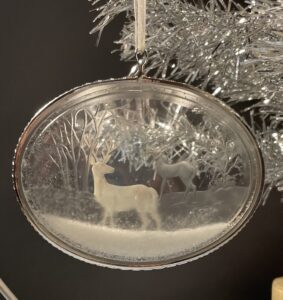
A snowy scene is etched on both sides of the glass; two deer walking apart yet aware of each other, in a wintery wood.
When the ornament is held with the adult deer facing you, it seems as if the deer is looking back, over his shoulder. The shadowy fawn in the background appears to be watching and waiting for the adult deer to make a decision. But turn the ornament around and the positions are reversed. The adult is no longer looking over his shoulder but is gazing into the shadowy world at the small fawn. His steps and his gaze are very much focused on the small deer. The fawn, on the other hand, is looking out, away towards something outside of our vision. Both positions are telling. The fawn waits for the adult deer to make his decision, to take the path “less traveled by,” even though the path that the deer will take is set out by the fawn. The paradox of Christianity.
The adult deer is a perfect example of a Christian. He is solid. He is not shadowy or vague, but entirely painted in. His hooves are firmly rooted on the ground, even being entirely covered by the heavy snow. He is part of the physical, visible world we all live in. He is concerned with the daily struggles of life, poised to flee or fight, while wrestling with the heavy snowfall, the daily crosses of his world. While he is engaged, he is being watched by a small, shadowy figure, a guiding spirit who assists and guides his steps. This spirit might be an angel or even a figure of Jesus himself, always just out of sight, but somehow his presence is felt. The fawn, not the adult, knows the way through the snowy woods. It’s eyes are on something else, something higher and distant, away out of time and space. Unlike the solid white adult deer, the fawn is almost transparent, pointing to a spiritual, unseen aspect.
The two deer in this ornament are in a profound relationship, despite the fact that they are on two different levels. They remind us that no matter what path is chosen, the traveler will not remain in the crossroads. A choice, consciously or not, is always made. St. Catherine of Siena talks about this in her book Dialogue. She writes that “as long as you are pilgrims in this life you are capable of growing and should grow. Those who are not growing are by that very fact going backward.”
Each year, this simple little ornament strikes a chord with me. After all the decorations are done and we are looking forward, preparing to set out again, it beckons and asks, “What path will you follow this year? And will you walk it with Me?”
Photos courtesy of Sarah Pedrozo.
*This ornament was designed by Hallmark artist Robert Hurlburt and is part of the Elegant Ornaments Collection, a group of ornaments often based on archived Hallmark greeting cards.
